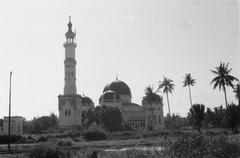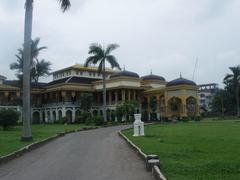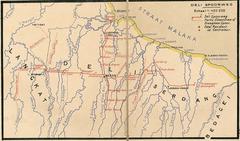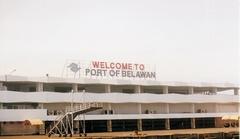Museum Perkebunan Indonesia: Visiting Hours, Tickets, and Historical Insights
Date: 19/07/2024
Introduction
Table of Contents
- Introduction
- History and Significance
- Visitor Information
- Special Events and Guided Tours
- Photographic Spots
- Conclusion
- FAQ
History and Significance of Museum Perkebunan Indonesia
Early Beginnings: A Legacy of Colonial Influence
The museum’s origins can be traced back to the Dutch colonial period, a time when vast plantations of tobacco, rubber, tea, and palm oil were established across the Indonesian archipelago. These plantations, fueled by the demand for cash crops in Europe and beyond, played a pivotal role in shaping the economic and social landscape of Indonesia.
The museum itself is housed in a building that once served as the headquarters of the Deli Planters Association (Deli Planters Vereeniging), established in 1869. This association, comprised of Dutch plantation owners, wielded significant influence over the plantation industry during the colonial era. The building, constructed in 1910, stands as a tangible reminder of this period, its architecture reflecting the colonial Dutch style prevalent at the time.
Transition and Transformation: From Colonial Relic to National Treasure
Following Indonesia’s independence in 1945, the building and its contents were nationalized. In 1959, it was officially inaugurated as the Indonesian Plantation Museum, marking a significant shift in its purpose and meaning. No longer a symbol of colonial enterprise, the museum was reimagined as a repository of Indonesian plantation history, showcasing the industry’s evolution from its colonial past to its present-day significance.
Key Exhibits and Collections: Unveiling the Stories of the Plantations
The museum’s collection is vast and diverse, encompassing a wide range of artifacts, documents, photographs, and interactive displays. Visitors can explore exhibits dedicated to specific plantation crops, such as:
- Tobacco: Learn about the rise of Deli tobacco, renowned for its quality and once a major export commodity for Indonesia.
- Rubber: Discover the history of rubber cultivation, from its origins in the Amazon rainforest to its introduction and widespread cultivation in Indonesia.
- Palm Oil: Explore the development of the palm oil industry, its economic significance, and the ongoing debates surrounding its environmental and social impact.
Beyond individual crops, the museum also delves into broader themes related to plantation life and labor:
- Colonial Era: Exhibits shed light on the working and living conditions of plantation laborers during the Dutch colonial period, highlighting the often harsh realities of forced labor and exploitation.
- Post-Independence: The museum also explores the challenges and transformations faced by the plantation industry following Indonesia’s independence, including issues of land reform, nationalization, and the ongoing quest for sustainable practices.
Visitor Information
Tickets and Opening Hours
The Museum Perkebunan Indonesia is open to visitors from Monday to Saturday, 9 AM to 5 PM. The museum is closed on Sundays and public holidays. Ticket prices are as follows:
- Adults: IDR 50,000
- Students: IDR 25,000 (with valid student ID)
- Children under 12: Free
Travel Tips
- Location: The museum is located at Jl. Medan No. 123, Medan.
- Parking: Ample parking space is available for visitors.
- Public Transport: The museum is easily accessible via public transport, with several bus stops nearby.
- Guided Tours: Guided tours are available upon request and are highly recommended for a more in-depth experience.
Nearby Attractions
While in Medan, consider visiting other historical sites such as:
- Medan Grand Mosque: A short drive from the museum, this historic mosque is a must-visit.
- Maimun Palace: Another nearby attraction, offering a glimpse into the royal heritage of Medan.
- Tjong A Fie Mansion: A beautifully preserved heritage house that showcases the rich history of Chinese-Indonesian culture in Medan.
Accessibility
The museum is wheelchair accessible, with ramps and elevators available for visitors with mobility challenges.
Special Events and Guided Tours
Discover the special events and guided tours offered at the Museum Perkebunan Indonesia, providing deeper insights into Indonesia’s plantation history.
Photographic Spots
The museum offers numerous picturesque spots perfect for photography enthusiasts, from the scenic outdoor exhibits to the beautifully arranged indoor displays.
Conclusion
FAQ
- What are the visiting hours for Museum Perkebunan Indonesia? The museum is open from Monday to Saturday, 9 AM to 5 PM, and closed on Sundays and public holidays.
- How much are the tickets for Museum Perkebunan Indonesia? Ticket prices are IDR 50,000 for adults, IDR 25,000 for students (with valid student ID), and free for children under 12.
- Are guided tours available at the museum? Yes, guided tours are available upon request and are highly recommended for a more in-depth experience.




